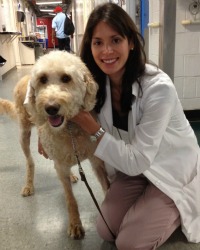Abigail Bertalan, VMD

Dr. Abigail V. Bertalan is the 2014 AKC Canine Health Foundation Clinician-Scientist Fellow from University of Pennsylvania School of Veterinary Medicine.
Dr. Bertalan completed her Veterinary Medical Doctorate from University of Pennsylvania in 2010. After an internship year at Red Bank Veterinary Hospital in Tinton Falls, NJ where she rotated through a wide range of specialty services including cardiology, neurology, oncology and surgery, Dr. Bertalan found her passion in Internal Medicine and began her residency in small animal Internal Medicine at University of Pennsylvania in 2011 and is focused on endocrine disease in the dog.
Fellowship Research Project
A recent study has shown that well-controlled diabetic dogs have a brief elevation in their blood glucose immediately after a meal (post-prandial hyperglycemia), also seen in human diabetic patients. Humans manage post-prandial hyperglycemia with an injection of a short-acting insulin such as lispro insulin at mealtimes in addition to their longer acting insulin. Basal-bolus insulin therapy has not yet been described in dogs. The goal of this study is to determine whether basal-bolus lispro and human analogue NPH insulin therapy in well-regulated diabetic dogs decreases postprandial hyperglycemia and improves clinical signs and glycemic control.
Ten client owned dogs with well-regulated diabetes mellitus fed the same high insoluble fiber diet (Hill's W/D) will be enrolled. They will also be deemed healthy based on a physical examination, complete blood count, chemistry screen, urinalysis and urine culture to ensure that they do not have any systemic illnesses. Dogs will have a 12 hour glucose curve performed, in which blood glucose is measured just prior to insulin administration and feeding (T0), every half hour for the first two hours to determine if the dog has postprandial hyperglycemia, and then every two hours for the next eight hours. If the glucose curve can demonstrate the presence of postprandial hyperglycemia, the dog will be enrolled in the study at that time. Fructosamine concentration will be measured at the time of enrollment and two weeks later at the time of completion of the study. Blood glucose curves will be performed twice, at the time of enrollment into the study and two weeks later at the time of completion of the study.
Animals will receive their usual dose of insulin after eating their normal meal. The first blood sample will be drawn one-half hour before feeding and administration of insulin (T0) and will then be drawn every 30 minutes (T0.5, T1, T1.5, T2) until two hours post-administration of insulin, and then every two hours for a total of ten hours (T4, T6, T8, T10). During the two week study period dogs will be treated at home with a a combination of subcutaneous NPH human analogue insulin and subcutaneous lispro insulin at a dose of 0.1U/kg every 12 hours. Based on extrapolation from several human and canine studies, this dose of lispro insulin should be safe and effective. Each dog in the study will return in two weeks to have a blood glucose curve and fructosamine test performed as described above.
Learn more about the AKC Canine Health Foundation Clinician-Scientist Fellowship Program and Adopt a Researcher.
Help Future Generations of Dogs
Participate in canine health research by providing samples or by enrolling in a clinical trial. Samples are needed from healthy dogs and dogs affected by specific diseases.



